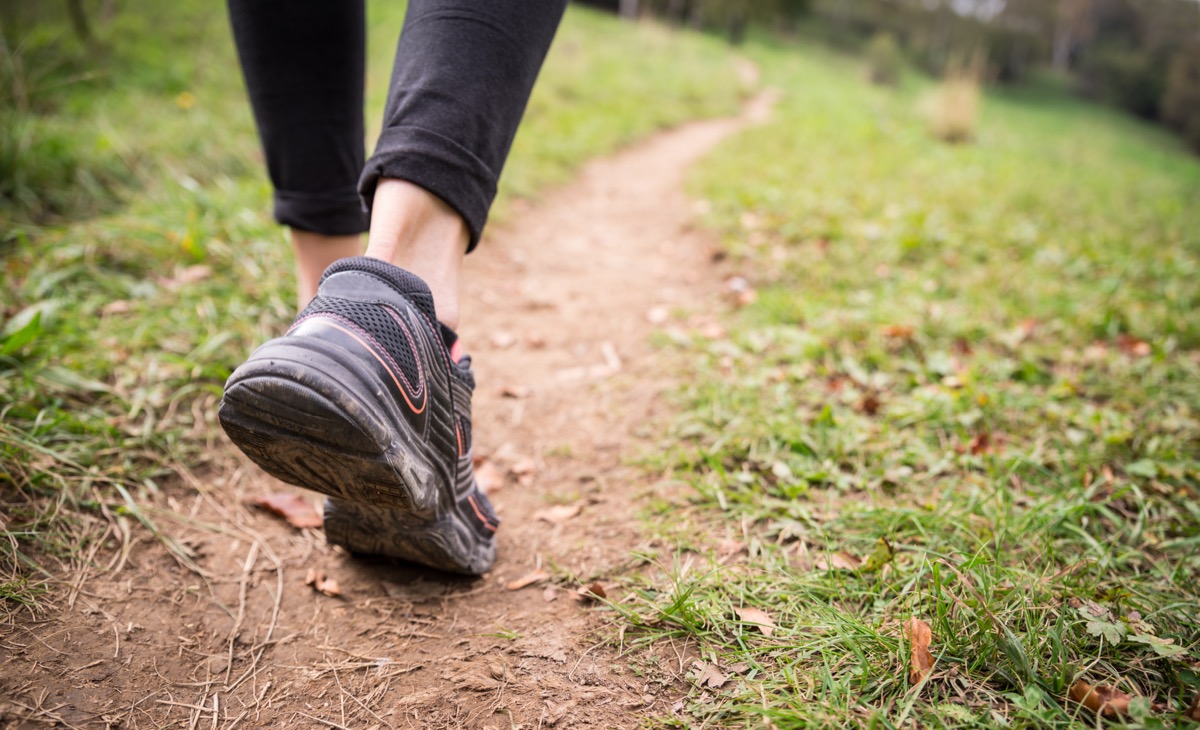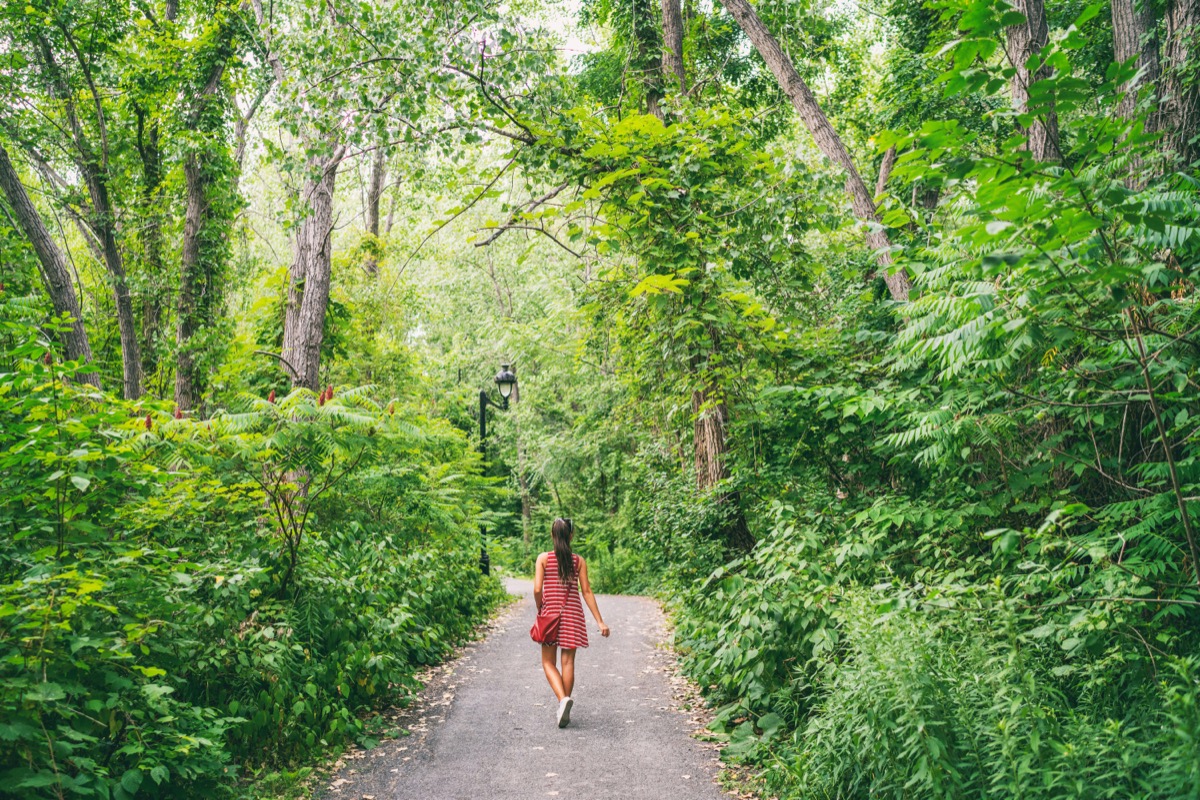Silent Walking Is the Latest Wellness Trend Everyone’s Talking About

Simple, widely accessible, and resulting in major cardio gains, walking is one of the easiest things you can do to boost your physical health and fitness. Now, experts say that one particular version of the activity—silent walking—can overhaul your mental health, too.
After exploding in popularity on TikTok, many people in the wellness world are now singing the trend’s praises and committing to their own silent walking challenges. They say there are countless benefits to walking without distraction and argue that virtually anyone can reap the benefits. Read on to learn why everyone is talking about silent walking—and why you might want to try this particular trend yourself.
RELATED: 8 Ways to Motivate Yourself to Take a Daily Walk.
Why You Should Try Silent Walking
What exactly is silent walking?

What separates a silent walk from a regular walk is the conscious absence of technology, friends, and other forms of distraction. However, Andrew White, CPT, a certified personal trainer and the owner of Garage Gym Pro, says it goes much deeper than embracing the absence of noise.
“Participants commit to a deeper engagement with their environment, consciously noting the feeling of the ground beneath their feet, the rhythm of their breathing, and the natural sounds around them. This absence of technological distractions including phones or music ensures a pure, unfiltered experience,” he explains.
RELATED: Jillian Michaels’ 7 Best Motivation Secrets for Exercising Outside.
It’s not actually anything new—and that’s a good thing.

Of course, walking in silence is as old as mankind itself—meaning this particular wellness trend is likely to have more staying power than other passing fads without any foundation.
Bayu Prihandito, a life coach and founder of Life Architekture, notes that even intentional silent walking for the sake of meditation has deeper historical roots than its recent climb to fame would suggest: “While it might seem like a recent trend, the concept has its roots in Zen Buddhist practices known as walking meditation.”
To try walking meditation, focus on the sensual experiences that make up the moment: the sights, smells, sounds, and sensations that anchor you in the present. Try not to think about getting to a particular destination, but instead embrace the journey and how your body feels in your current state of movement.
RELATED: Taking a “Smell Walk” Slashes Stress and Boosts Your Mood—Here’s How to Do It.
Here’s why silent walking is having such a moment.

While the concept of walking in silence is not new, it is striking a chord with Gen Z, a generation steeped in technology and an atmosphere of near-constant connection.
“In a world saturated with screens, apps, and alerts, many people are feeling the strain of constant connectivity. Silent walking is a direct counter to this, offering a respite and a return to simplicity,” explains White. He adds that these walks often take place in parks, forests, or other natural environments, which he says amplifies their appeal.
This conscious urge to disconnect from technology and reconnect with nature seems to address a primal need that often goes unmet in modern society. In fact, one recent study imagines a future in which doctors prescribe time spent in nature much in the way they might recommend a certain amount of time spent exercising every week.
RELATED: 5 Clothing Items You Shouldn’t Wear on a Walk.
It comes with major mental health benefits.

Combining the benefits of physical exercise with the soothing effect of a distraction detox, there’s no shortage of ways that silent walking can boost your mental health. Studies have found that walking practices have been linked to lower levels of depression and anxiety, and higher levels of happiness and life satisfaction.
“I believe the rise in its popularity can in part be attributed to the increasing awareness of mental health and the benefits of mindfulness practices, most notably among Gen Z,” says Prihandito. “Additionally, the pandemic has heightened feelings of anxiety and depression, making practices like silent walking even more appealing as a natural approach to mental well-being.”
“The practice encourages introspection and self-reflection. This can help individuals process emotions, gain clarity, and achieve a sense of inner balance,” agrees White.
RELATED: 8 Easy Ways to Make Walking More Fun.
It’s also great for your physical fitness.

Silent walking is also likely to enhance your fitness levels. “Walking, in general, is fantastic for cardiovascular health, muscle tone, and flexibility,” says White.
In fact, a 2023 study by the European Society of Cardiology found that walking just under 4,000 steps per day was enough to lower your all-cause mortality risk. The meta-analysis, which reviewed data from 17 global studies and included over 225,000 participants, found that every 1,000 steps above that amount further lowered one’s mortality risk by an additional 15 percent.
RELATED: The Best Times of Day to Walk for Your Health, Experts Say.
A guided meditation or a walk with friends may be better for some people.

White acknowledges that for some, distraction-free time with one’s thoughts can be “unsettling”—especially in times of high anxiety. If you suspect a silent walk will do more harm than good by causing you to overthink or ruminate on negative thoughts, you may instead benefit from listening to a guided meditation while you walk or walking with friends.
However, Laura Saltman, a mindfulness and meditation teacher, says that in her three years of silent walking, the benefits have far outweighed any discomfort. She says since beginning a silent walking practice, she has gained mental clarity, more energy, a greater appreciation for the world around her, improved sleep, and a deeper sense of social connection to others in her community.
For more wellness news sent directly to your inbox, sign up for our daily newsletter.